The rise of ISIS has generated strong concerns in nations around the world, and a new Pew Research Center survey finds broad global support for American military efforts against the terrorist group. And unlike the Iraq War a decade ago, the current U.S. air campaign in Iraq and Syria is backed by majorities in America’s European allies and endorsed by publics in key Middle Eastern nations.
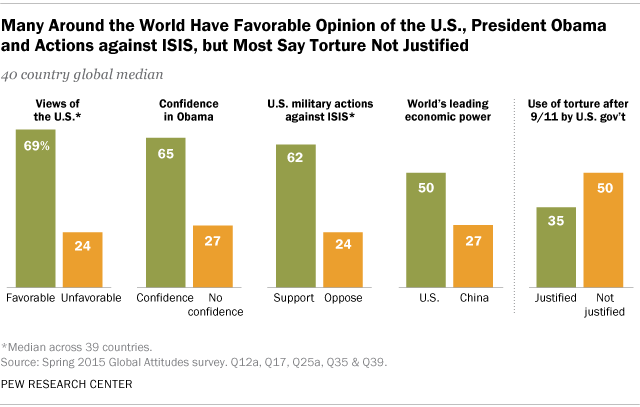
And more broadly, Americans are more supportive of using torture than others around the world. The U.S. is one of only 12 countries where half or more approve of their own government using torture against suspected terrorists.
By far, the sharpest decline in Obama’s image occurred in Israel. Following a year marked by tensions between Obama and Israeli Prime Minister Benjamin Netanyahu over negotiations with Iran, confidence in Obama slipped from 71% in Israel to 49%. Eight-in-ten Israelis disapprove of how Obama is dealing with Iran’s nuclear program.
Meanwhile, assessments of U.S. economic power are on the rise. After the onset of the Great Recession in 2008, many believed the global economic balance of power was shifting, as China’s economy expanded while the U.S. struggled. But over the last year, as the American economy has continued to rebound, the number of people naming the U.S. as the top economy has increased, especially in Europe. Still, when asked about the future, most publics think China has eclipsed or will eventually eclipse the U.S. as the dominant superpower.

China’s rise has generated anxiety and security concerns among many of its neighbors, and the Asian nations surveyed mostly welcome U.S. plans to commit more military resources to the Asia-Pacific region, which is part of a U.S. strategy sometimes referred to as the “pivot” or “rebalancing” toward Asia. Half or more in Vietnam, the Philippines, Japan, India, Australia and South Korea say a greater American military commitment to the region would be a good thing because it could help maintain peace. Malaysia is the only Asian nation where more than half (54%) takes the opposite view that the pivot is bad because it could lead to conflict with China.
There is also considerable support for the major economic component of the pivot: the Trans-Pacific Partnership, or TPP. This trade agreement, which is currently under negotiation, would deepen economic ties among a number of nations on both sides of the Pacific. Roughly half or more in seven of the nine TPP nations in the study believe the agreement would be a good thing for their country.
In the U.S., there are substantial partisan divides over American engagement in Asia. Republicans are less supportive than Democrats or independents of a potential trade deal, but more supportive of American military commitments in the region.
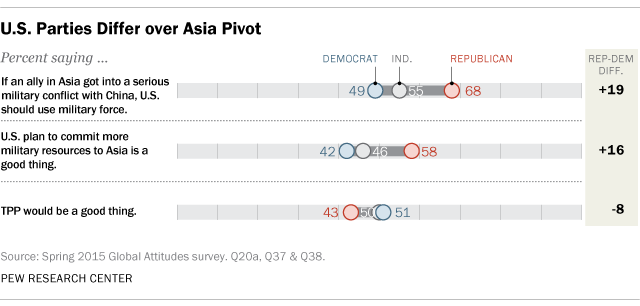
Even though Asian publics largely welcome American economic and security initiatives, they also value their economic relationships with China. In fact, in Australia and South Korea, two close American allies, the balance of opinion is that having strong economic ties with China is more important than having such ties with U.S.
In China itself, America’s intentions are viewed with suspicion. More than half (54%) believe the U.S. is trying to prevent China from becoming equally as powerful; just 28% say the U.S. accepts that China will eventually be an equal power.
These are among the main findings of a new Pew Research Center survey, conducted in 40 nations among 45,435 respondents from March 25 to May 27, 2015. (See here for a map of countries included in the survey).
China’s Global Image
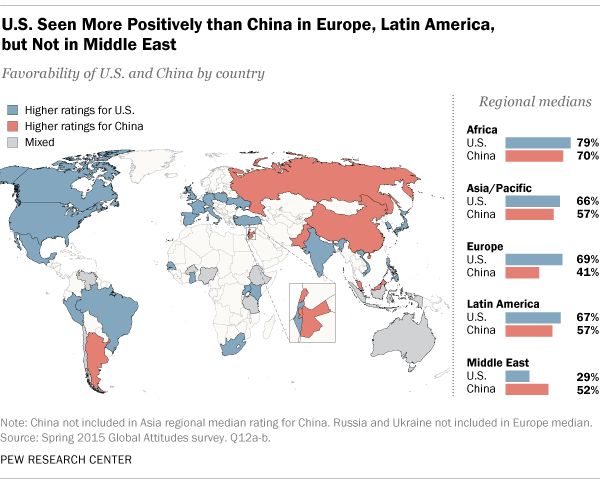
One thing China and the U.S. have in common is that both nations tend to get better ratings among young people. In 18 nations, people under age 30 are more likely than those 50 and older to express a positive opinion of China. And this is especially true in the U.S., where 55% of 18-29 year-olds offer a favorable view, compared with 27% of people 50 and over. Meanwhile, 59% of Chinese under age 30 see the U.S. favorably, compared with only 29% of those ages 50+.
Europeans More Critical of U.S. on Personal Freedoms, but Positive about Its Economic Power
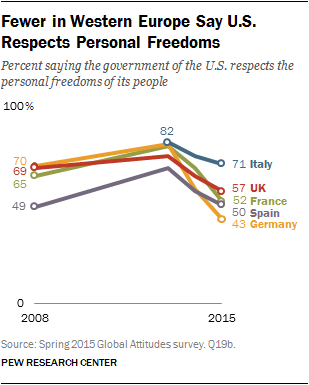
Europeans, however, stand out as increasingly critical of the U.S. government when it comes to protecting the freedoms of its people.
Across the Western European nations polled, ratings for the U.S. on this issue declined between 2013 and 2014, at least partly in response to Edward Snowden’s revelations about the NSA’s electronic surveillance programs. This year’s survey highlights further declines, perhaps in response to highly publicized stories over the last year, such as those concerning harsh interrogation techniques in the post-9/11 era, as well as the controversy in the U.S. regarding police treatment of African-Americans and other minorities.
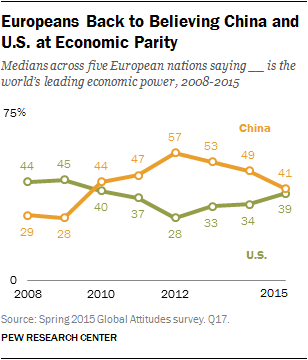
At the same time that Europeans give the U.S. poorer ratings for this element of soft power, they believe American economic power is on the rise. Between 2009 and 2012, Europeans increasingly saw China, rather than the U.S., as the world’s economic leader. However, the pendulum has swung back in the other direction since 2012, and today Europeans are now essentially divided on this question. A median of 41% across five EU nations – Britain, France, Germany, Poland, Spain – name China as the top economy, while a median of 39% say it is America.
American Public an Outlier on Torture
Views about America’s post-9/11 interrogations are strongly correlated with how people feel about the potential use of torture in their own countries. Across the nations surveyed, a median of 40% believe their own governments would be justified in using torture against people suspected of terrorism in order to gain information about possible attacks. A median of 45% oppose this idea.
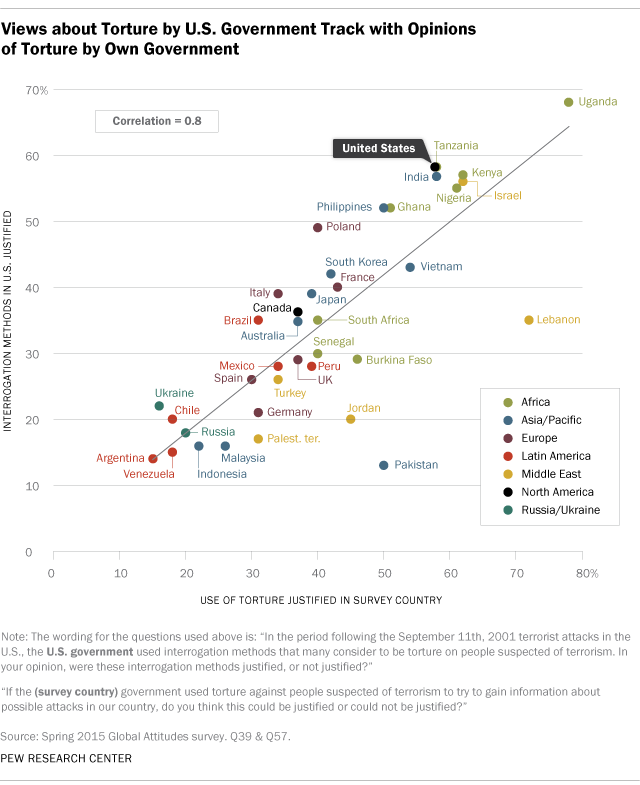
Countries with higher levels of support for the use of torture by their own governments tend to also have higher levels of support for the use of torture techniques by the U.S. government following the September 11, 2001 terrorist attacks.




